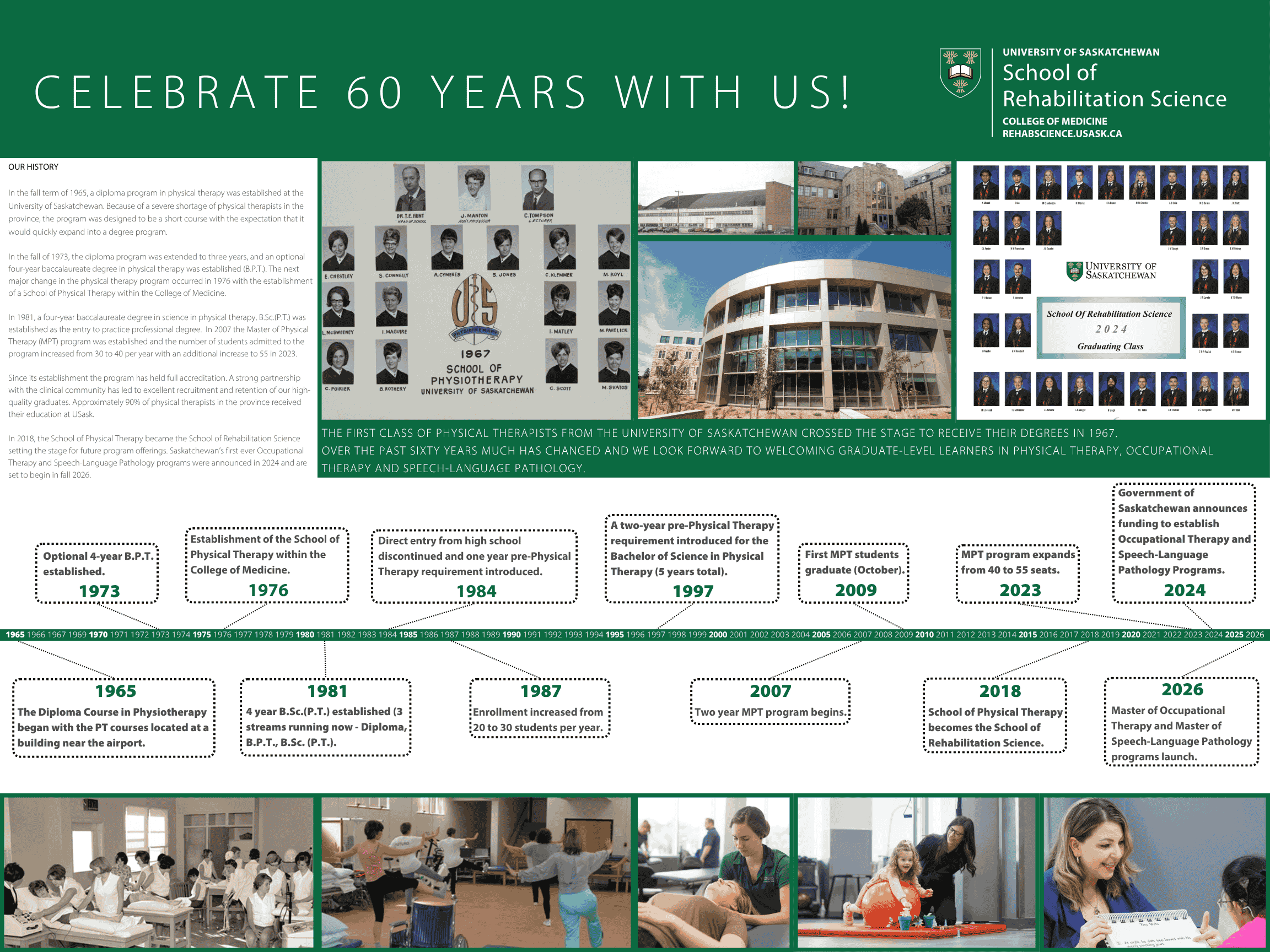Mission and Vision
Our mission
Excellence in Rehabilitation Science teaching, research, scholarship, and leadership to improve the quality of life and well-being for all people of Saskatchewan and beyond.
Our vision
We will be the outstanding School of Rehabilitation Science in Saskatchewan, nationally and internationally recognized for innovative research and graduate programs, high quality interprofessional education, and exceptional knowledge translation. We will demonstrate leadership in rehabilitation science to advance research, learning, knowledge sharing, and reconciliation and inclusion with and by Indigenous peoples and communities.
Who we are
The School of Rehabilitation Science fosters a healthy environment that promotes a positive work experience, life-long learning, and professional pursuits of Rehabilitation Science for students, faculty, and staff. As part of the University of Saskatchewan, we are situated in the vibrant city of Saskatoon on Treaty Six territory and the traditional homeland of the Métis.
Recognized for a growing and diverse student body, we have gained a reputation nationally and internationally for preparing high-quality, collaborative clinicians and rehabilitation researchers, focused on improving function while promoting optimal ability, mobility, activity, and participation. As a socially accountable organization, we are proud of our alumni, students, faculty and staff, who have been engaged citizens and leaders since 1965. We respond to changing environments, contribute to high quality clinical care in local and global communities, and are committed to improving health and the healthcare system through innovative research and evidence-based practice.
Collaboration is a hallmark of our School and is embedded in all aspects of our mission. A dynamic forward-looking faculty and staff demonstrate resilience, compassion, humility, professionalism and a passion for advancing rehabilitation science and health-related learning, teaching, research, and mentorship.
The Master of Physical Therapy Program (MPT) is our flagship program, governed by the College of Graduate and Post-doctoral Studies (CGPS). The MPT Program is designed to provide graduates with the entry-level clinical requirements to obtain a license to practice physiotherapy in Saskatchewan and Canada.
Graduates of an entry level degree in physical therapy (e.g., M.P.T., B.Sc.P.T.) who wish to pursue advanced research training under a SRS faculty member are encouraged to consider the M.Sc. and Ph.D in Health Sciences thesis-based graduate programs.
Our principles and values
The aspirations of the School of Rehabilitation Science community are best achieved through a belief in principles that are fundamental to the University of Saskatchewan and through commitment to and practice of values--ways of conducting ourselves-- that serve to guide our policies, behaviors and collaborations.
The School of Rehabilitation Science community believes in the following principles:
The School of Rehabilitation Science community is committed to acting in accordance with the following values:
Strategic priorities
As is common in the health sciences, many of our priorities are influenced by changes in the health and education sectors and environments outside the university (local, provincial, regional, national and international). We will continue to strengthen and integrate activities with our partners and maintain organizational flexibility to respond to opportunities as they arise. We will continue to direct our work and measure our progress in consideration of the goals of the university and the College of Medicine.
Four priorities have been identified for further development, enhancement and/or requiring new resources into the next planning cycle. These priorities directly link to initiatives and opportunities in the College of Medicine strategic plan. It is also important to emphasize our ongoing commitment to the Masters of Physical Therapy (MPT) program as a core strength and priority.
At this stage the university has identified four themes as overarching criteria on which units may assess their progress. It has been suggested that units ask how each of their priorities would make the university more sustainable, connected, diverse and creative. Each of the identified priorities is directly linked to one or more of these themes and as the institutional plan takes shape we will continue to reflect on and refine specific goals as appropriate.
Establish a School of Rehabilitation Science
Establishing a hub for rehabilitation science education, research and community engagement continues to be a strategic priority carried forward from the College of Medicine and School of Physical Therapy previous integrated plans.
Enhancing Indigenous Initiatives
Working closely with the College of Medicine, other health professional programs, university and members of our Indigenous communities, we are committed to advancing initiatives that will strengthen education and research related to Indigenous content and approaches in our school.
Research Graduate Programming and Clinical Research
Enhanced and innovative graduate programming is considered critical to positioning the School as the hub for rehabilitation science education and research in Saskatchewan. Connected with this priority is the advancement of clinical research supported by high quality research facilities.
Interprofessional Education and Research
To advance interprofessional collaborative practice and patient-centred care, we continue our commitment to working with health professional colleagues to further develop the Interprofessional Education (IPE) curriculum and strengthen interdisciplinary research.

